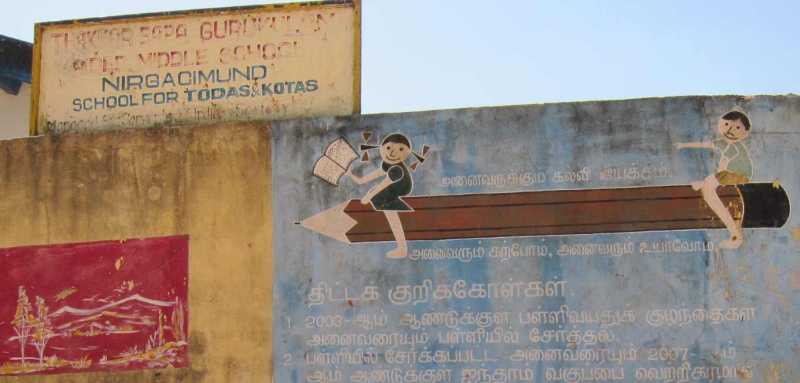It was nothing short of making the impossible possible. The bringing together of various groups of nomadic tribes like the Nari Koravars, Paliyars, Kaatu Naickers, Sholigars, astrologers, palmists, whip dancers, leather puppet showmen circus performers and many itinerant occupational category people to organize a conference was indeed a daunting task.
The first conference of Tamil Nadu Nomads Federation 2010 held here at Gandhi Museum on Sunday was an event which epitomised how a group of tribesmen were long neglected not only by the State but also the civil society as the speakers stated that it was a conference organised by “us” as neither the civil societal institution nor the State “came to help us reclaim our rights”.
The different nomadic and semi nomadic tribesmen represented their forms of occupation by wearing their traditional garb and carrying whip, ‘jhattiwar,’ ‘urumi melam’ and decorated bulls and were performing all through the rally which started and Tamukkam grounds and reached Gandhi Museum, the venue for the conference.
C.Kamaraj, District Collector, said that education is the only means to combat the oppression faced by these tribes. […]
R. Maheswari, secretary, The Empowerment Centre of Nomads and Tribes (TENT), Madurai, said that the condition of the nomads was worse than that of any other marginalised section and recalled the suffering and humiliation she faced during her younger days.
“During my childhood, I begged on the streets. When children of my age were going to school, for children like us schools were a distant dream.” Somehow, I overcame all the obstacles and we have formed this organisation which would fight till everyone in the community get education.
C. Sathyanarayanan, Director, Tribal Research Centre, Nilgiris, said that the Government in 2005 appointed a National Commission for De-notified, Nomadic and Semi Nomadic tribes to study various developmental aspects of these Tribes. However the recommendations of the Commission have not been implemented.
The demands of the nomadic tribes include establishment of a welfare board, to issue community certificates, to provide 5 per cent reservation for them in education and employment. They also demanded that the State, keeping in mind the itinerant status of the tribesmen, should issue mobile voter identity and mobile ration cards. The other demands were to conduct a survey and create a categorical status of Nomadic Tribe (NT) which shall hence be referred in the Government records. Leaders of various nomadic tribe and semi-nomadic tribe association and social activists took part in the conference.
Source: “Nomadic tribes demand welfare board”, The Hindu, MADURAI, September 20, 2010
Address : https://www.thehindu.com/news/cities/Madurai/article700470.ece
Date Visited: 16 September 2020
[Bold typeface added above for emphasis]

Learn more about Multi-lingual education & Assimilation >>
“Thakkar’s 1941 lecture advocated using tribal tongues as a ‘bridge’,
but in practice, even this did not happen.” | The Hindu, 13 February 2021 >>
Subscribe to Vidyodaya’s educational videos on YouTube: Kaathadi >>
Up-to-date reports by Indian journalists and commentators
List of Indian magazines and web portals covered by the present Custom search engine
To search Indian periodicals, magazines, web portals and other sources safely, click here. To find an Indian PhD thesis on a particular tribal community, region and related issues, click here >>
Search tips
Combine the name of any particular state, language or region with that of any tribal (Adivasi) community.
Add keywords of special interest (health, nutrition endangered language, illegal mining, sacred grove); learn about the rights of Scheduled Tribes such as the “Forest Rights Act” (FRA); and the United Nations “Declaration on the Rights of Indigenous Peoples”, “Universal Declaration of Human Rights”, “women’s rights”, or “children’s right to education”.
Specify any other issue or news item you want to learn more about (biodiversity, bonded labour and human trafficking, climate change, ecology, economic development, ethnobotany, ethnomedicine, global warming, Himalayan tribe, hunter-gatherers in a particular region or state, prevention of rural poverty, water access).
For official figures include “scheduled tribe ST” along with a union state or region: e.g. “Chhattisgarh ST community”, “Scheduled tribe Tamil Nadu census”, “ST Kerala census”, “Particularly Vulnerable Tribal Group Jharkhand”, “PVTG Rajasthan”, “Adivasi ST Kerala”, “Adibasi ST West Bengal” etc.
In case the Google Custom Search window is not displayed here try the following: (1) toggle between “Reader” and regular viewing; (2) in your browser’s Security settings select “Enable JavaScript” | More tips >>
See also
Adverse inclusion | Casteism | Rural poverty
Demographic Status of Scheduled Tribe Population of India (Census figures 2011)
Fact checking | Figures, census and other statistics
Human Rights Commission (posts) | www.nhrc.nic.in (Government of India)
Search tips | Names of tribal communities, regions and states of India
“What is the Forest Rights Act about?” – Campaign for Survival and Dignity
“Who are Scheduled Tribes?” – Government of India (National Commission for Scheduled Tribes, NCST)